How to choose envelopes and sleeves? Buyer's guide
If there exists a large diversity in the envelopes and the administrative envelopes, it is because they respond each to a well-defined use. You will not use the same (administrative) envelope for sending, for example, an invitation, an invoice or a fragile object. But it is not always easy to know which size, material, grammage or closing system will be the best for your mail. In order to help you to find the correct type, we will give you some tips here.
Index
1 Measures and sizes
2 Envelopes and sleeves for voluminous, heavy or fragile shipments
3 The types of closing systems
4 The different types of windows
5 The different grammages
6 Norms and labels
1 - Measures and sizes
GOOD TO KNOW
The term envelope is used when the opening is on the longest side, and the term administrative sleeveappears for envelopes with the opening on the shortest side.
THE MEASURES OF COMMERCIAL ENVELOPES
The commercial envelopes are used for daily mail and they exist in different qualities and dimensions, in order to be adapted to the size and the importance of the mail that you need to send. Each envelope size (C4, C5…) corresponds with a paper size (A4, A5…). These sizes are international standards, determined by the ISO 216 norm.
You will find some indications here, in order to help you to find the adequate envelope for your document:
- - An envelope in C4 size (dimensions 229 x 324 mm) is suited for an A4
- - An envelope in C5 size (dimensions 162 x 229 mm) is suited for an A5
- - An envelope in C6 size (dimensions 114 x 162 mm) is suited for an A6
- - The envelopes in DL size (dimensions 110 x 220 mm) and C5/C6 size (dimensions 114 x 229 mm) are also suited for an A4 (folded in 3). The envelopes in DL size are by the way the most used model in the world, but they are more and more replaced by the envelopes in C5/C6 size.
| Envelope size | Size (H x W in mm) | Paper size in the envelope | |
| C4 envelope | 229 x 324 mm | A4, A3 folded in 2 | 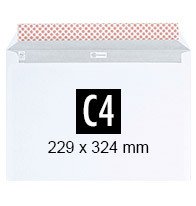 |
| C5 envelope | 162 x 229 mm | A5, A4 folded in 2 | 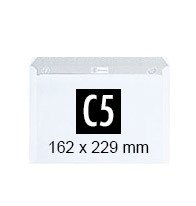 |
| C5/C6 envelope | 114 x 229 mm | A4 folded in 3, A5 folded in 2 | 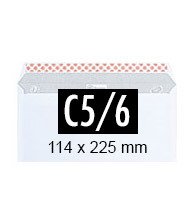 |
| C6 envelope | 114 x 162 mm | A4 folded in 4 | 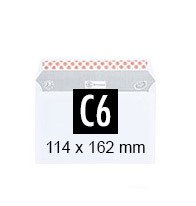 |
| DL envelope | 110 x 220 mm | A4 folded in 3, A 5 folded in 2 | 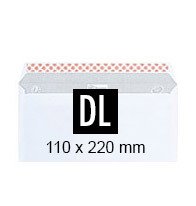 |
ENVELOPES FOR USE IN AN AUTOMATIC FOLDING MACHINE
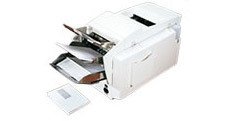
Consult the envelopes for use in an automatic folding machine
CORRESPONDENCE ENVELOPES
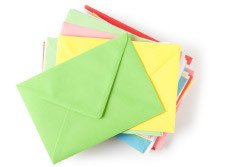
Consult the envelopes for correspondence
GOOD TO KNOW
For all your votings, there exist specific envelopes for "elections".Consult the election envelopes
THE STANDARD SLEEVE SIZES
Standard administrative envelopes are used for daily shipment, for your classic mail or for documents with a limited volume.
The look will depend on the use.
- In standard brown kraft: a budget-friendly solution for standard mail.
- In white kraft: an elegant finish for branding.
- In white vellum: white vellum is grain-free, clean and smooth, in order to upgrade your mail. A perfect result, ideal for prestigious shipments.
Consult the standard administrative sleeves
You can choose the aspect in function of the intended use.
- - A sleeve in C5 size (dimensions 162 x 229 mm) is suited for A5 paper (or an A4 folded in 2)
- - A sleeve in B5 size (dimensions 250 x 176 mm) is suited for A5 paper (or an A4 folded in 2)
- - A sleeve in C4 size (dimensions 229 x 324mm) is suited for A4 paper
- - A sleeve in B4 size (dimensions 250 x 353 mm) is suited for A4 paper
| Sleeve size | Size (W x H in mm) | Paper size in the sleeve | |
| C4 sleeve | 229 x 324 mm | A4 | 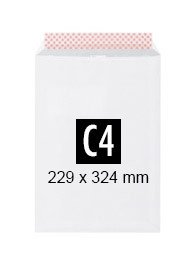 |
| C5 sleeve | 162 x 229 mm | A5, A4 folded in 2 | 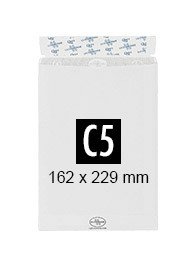 |
| B4 sleeve | 250 x 353 mm | A4 | 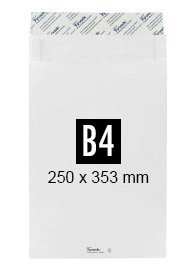 |
| B5 sleeve | 176 x 250 mm | A5 or A4 folded in 2 | 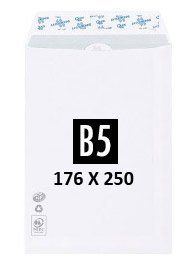 |
| Sleeve 24 | 260 x 330 mm | A4 | 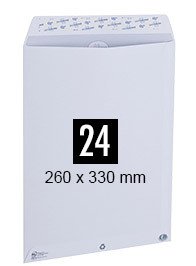 |
2 - Envelopes and sleeves for voluminous, heavy or fragile shipments
In general, administrative sleeves with bellows, with extra firmness or with a padding, are used for voluminous, heavy or fragile shipments.
SLEEVES WITH BELLOWS
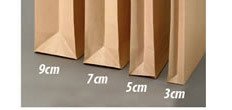
Consult the sleeves with bellows
REINFORCED SLEEVES
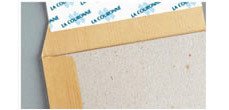
Consult the reinforced sleeves
PADDED SLEEVES
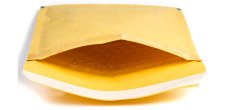
Consult the padded sleeves
| Brown/white armed kraft | 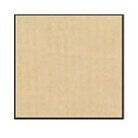 | Very high resistance, anti-perforation, lined with a reinforcing film in order to protect from humidity |
|---|---|---|
| Tyvek | 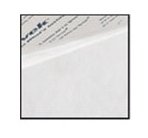 | Indestructible, waterproof, perfect smooth finish |
| Polyethylene | 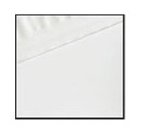 | Lightness and non-tear system |
| Polyethylene or lined kraft with air bubbles | 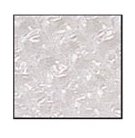 | Protection against shocks, for fragile shipments |
| Lined kraft with foam | 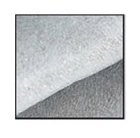 | Protection against shocks and scratches, for fragile objects and surfaces |
GOOD TO KNOW
There exist also other types of protective packaging for specific shipments, for example round or squared tubes in which you can put posters, maps or schemes, boxes or sleeves for sending books.Consult the mail boxes and tubes
3 - The types of closing systems
THE GUMMED FLAP
This is the cheapest solution! You can use it manually, but envelopes with this closing system are also compatible with automatic folding machines. In order to close an envelope with a gummed flap, the glued strip on the flap needs to be wet and you need to push hard on it.
Consult the envelopes with gummed flap
Consult the envelopes with gummed flap
THE SELF-ADHESIVE FLAP
This is the fastest solution! They are perfect for sporadic shipments or for envelopes that need to be personalized in advance with your logo and stored for the future. In order to close this envelope, it is sufficient to press the two flaps against each other.
Consult the envelopes with self-adhesive flap Consult the administrative sleeves with self-adhesive flap
Consult the envelopes with self-adhesive flap Consult the administrative sleeves with self-adhesive flap
THE SELF-ADHESIVE FLAP WITH PROTECTIVE STRIP
This is the easiest and most efficient solution! It is ideal for daily shipments. In order to close this type of envelope, you just need to remove the protective strip and close the flap.
Consult the envelopes with protective strip
Consult the envelopes with protective strip
GOOD TO KNOW
When the envelopes are not stored correctly, it is possible that their quality will deteriorate. It is strongly recommended to store them in their original packaging, in a dry room, and protected from the daylight. Try to avoid to put them close to windows or heating systems. Correctly stored envelopes with a gummed flap or with a self-adhesive flap with protective strip have e lifespan of 2 years. Envelopes with a self-adhesive flap have, when stored correctly, a lifespan of 1 year.4 - The different types of windows
You can save time with windows, as you don’t need to write the address of the addressee on the envelope. This is particularly practical for grouped shipments. The size of the window depends on the space that will be occupied by the addresses.
- for an address of 3 lines: window of 35 mm
- for an address of 4 to 5 lines: window of 45 mm
- for an address of 5 to 6 lines: window of 50 mm (present on most of the administrative sleeves)
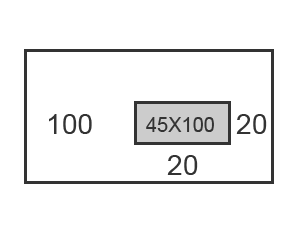 | DL envelope (1) Dimension of the window: 45 x 100 mm |
|---|---|
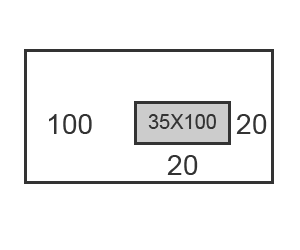 | DL envelope (2) Dimension of the window: 35 x 100 mm |
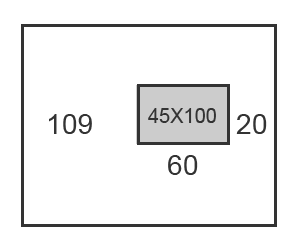 | C5 envelope Dimension of the window: 45 x 100 mm |
GOOD TO KNOW
The window with NF certificate is made from translucent paper, which makes it possible to recycle the envelope entirely after use. The envelopes with a window without the NF certificate cannot be recycled.5 - The different paper grammages
The grammage that you select, will have an influence on the image of your company and on the level of protection for the content of your shipments.
Here are the different grammages of envelopes:
80 g/m2 : a standard grammage and a budget-friendly solution for your daily mail.
90 g/m2 : with an excellent price/quality ratio, in order to improve your image among the addressees for a moderate price
100 g/m2 : for qualitative shipments, in order to give your company a prestigious image
120 g/m2 and more: an optimal protection for voluminous shipments
6 - Norms and labels
All the envelopes and administrative sleeves at Bruneau are manufactured following the environmental norms and are always labelled. By using these products, your company will contribute to the protection of the environment, with as less impact as possible on it.
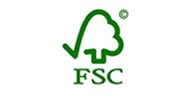
FSC (Forest Stewardship Council), owner of the self-titled label, is a non-governmental organization, created in 1993 to encourage worldwide sustainable forestry. This logo guarantees that the wood originates from forests, in which the environmental and social norms are respected.
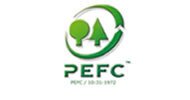
The PEFC Council (Programme for the Endorsement of Forest Certification schemes) is an international organization that encourages sustainable forestry with the aid of certificates and labels on products in wood, or made on the basis of wood. Products that follow the PEFC declarations or that received the PEFC label, guarantee that the material originates from forests with a sustainable management.
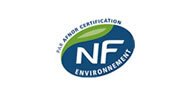
The products that received the label NF Environnement guarantee that their impact is as small as possible on the environment, compared to products with similar characteristics. This norm is the official ecological certificate in France, delivered by Afnor.
The norm NF Environnement on our products assures:
- the optical and mechanical characteristics of the envelope and the printability.
- the reduction of the energy consumption and the emissions into air and water during the fabrication of the paper and the envelope.
- the reduction of used dangerous substances (for the paper, the glue and the ink).
- the improvement of the recyclability of the envelope.

EcoFolio is an ecological organism that organizes and finances paper recycling. This task of common interest has been assigned to them by the government and its main goal is to mobilize, orientate and guide all the involved parties for the paper collection and recycling. With EcoFolio, Bruneau improves the paper recycling process.

Triman is a mark that corresponds with a regulatory obligation and is subject to a diffusion among the customers. In accordance with the application decree for the public marking of recyclable products with precise sorting instructions, every producer needs to put a public marking on the product, or if not possible, on the packaging, on the manual or on any other (dematerialized) support, so the user is aware of the sorting instructions.